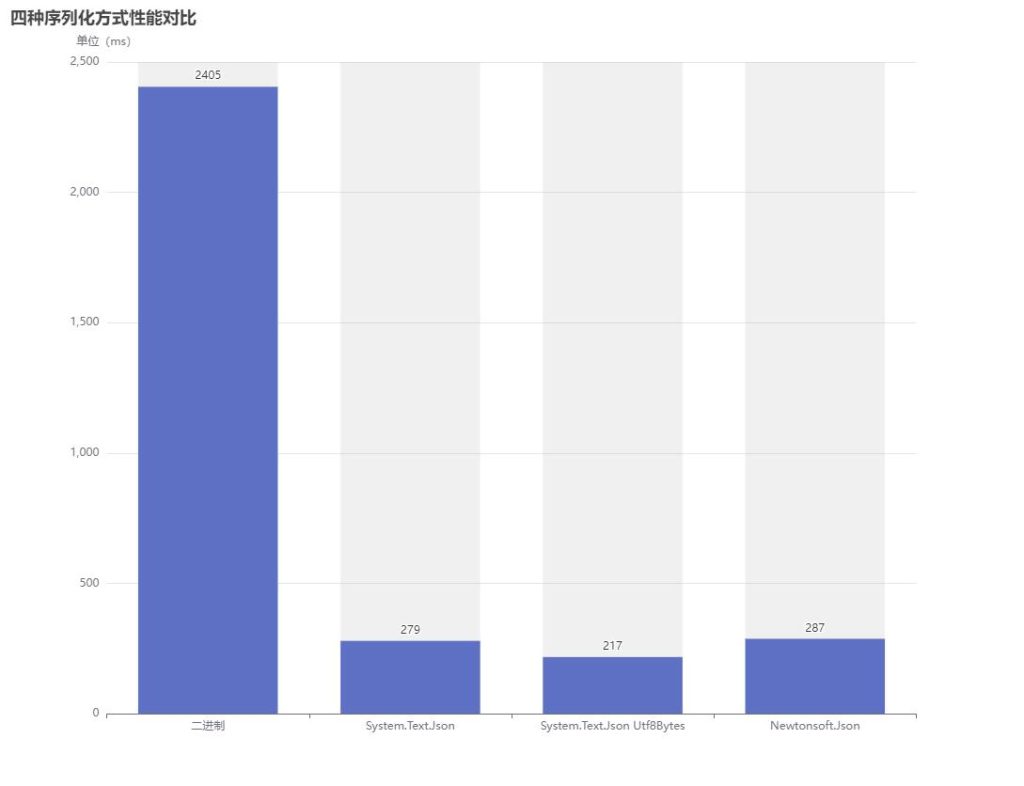JSON已经成为几乎所有现代.NET应用程序的重要组成部分。目前.NET处理JSON主要使用System.Text.Json和Newtonsoft.Json这两个库。
从.NET Core 3.0开始,System.Text.Json就作为内置的Json序列化与反序列化工具,以替代Newtonsoft.Json(据说Newtonsoft.Json的开发者都入职微软了)。根据微软官方描述,相对于Newtonsoft.Json,可以获得1.3倍速--5倍的速度,具体也取决于使用场景。
于是我做了个实验,来对比了下System.Text.Json和Newtonsoft.Json的序列化与反序列化的性能。顺便加入了已经弃用的二进制序列化方式。
实验方法为对同一个对象进行序列化和反序列化,反复执行100000次,取20次的平均时间。对照组有4个,分别是BinaryFormatter、System.Text.Json一般字符串序列化、System.Text.Json Utf8Bytes序列化、Newtonsoft.Json序列化。
相对Newtonsoft.Json而言,System.Text.Json序列化和反序列化更加严格,比如默认区分发大小写,不会序列化公共字段等。为了贴合日常使用场景,System.Text.Json测试方法解除了一些限制,并加入了4个常用的自定义JsonConverter类型。
System.Text.Json的JsonSerializerOptions构造方法如下:
private static JsonSerializerOptions BuildOptions(JsonSerializerOptions options)
{
if (options == null)
{
lock (_locker)
{
if (_options == null)
{
_options = new JsonSerializerOptions()
{
Encoder = JavaScriptEncoder.Create(UnicodeRanges.All),
//忽略大小写
PropertyNameCaseInsensitive = true,
//允许注释
ReadCommentHandling = JsonCommentHandling.Skip,
//允许尾随逗号
AllowTrailingCommas = true,
//允许将字符串读取为数字
NumberHandling = JsonNumberHandling.AllowReadingFromString,
//包含公共字段
IncludeFields = true,
};
_options.Converters.Add(new DateTimeConverter());
_options.Converters.Add(new DateTimeNullableConverter());
_options.Converters.Add(new ExceptionConverter());
_options.Converters.Add(new TypeConverter());
}
}
}
return _options;
}测试对象如下:
[Serializable]
public class SystemLog
{
public int Id { get; set; }
public string LogType { get; set; }
public string Describe { get; set; }
public string Localtion { get; set; }
public string Stack { get; set; }
public DateTime CreateTime { get; set; }
public Guid Guid { get; set; }
public Dictionary<string, object> ExtFileds { get; set; }
}
private static readonly SystemLog testModel = new SystemLog()
{
Id = 1,
LogType = "Error",
Describe = "这个是描述,这个是描述,这个是描述,这个是描述,这个是描述",
Stack = "",
CreateTime = DateTime.Parse("2022-07-10"),
Guid = Guid.NewGuid(),
ExtFileds = new Dictionary<string, object>()
{
{ "A", DateTime.Parse("2022-07-10")},
{ "B", "AAAAAA"},
}
};测试电脑环境:
CPU: i7-12700KF 3.61 GHz
内存:DDR4 3600 32G
使用包版本:
Newtonsoft.Json:13.0.1
System.Text.Json:6.0.5
.NET:6.0
测试结果如下:

100000次序列化耗时:
二进制序列化:2405ms
System.Text.Json:279ms
System.Text.Json Utf8Bytes:217ms
Newtonsoft.Json:287ms
在这个场景下面,System.Text.Json比Newtonsoft.Json快了3%,System.Text.Json Utf8Bytes比Newtonsoft.Json快了24%,System.Text.Json Utf8Bytes比System.Text.Json快了0.22%。
根据测试结果,不难看出,System.Text.Json相对Newtonsoft.Json而言,确实有性能优势。特别是序列化UTF-8 字节数组时,对比更加明显, 出现这种差别的原因是字节(作为 UTF-8)不需要转换为字符串 (UTF-16)。
在进行实验时,额外加入了二进制序列化(BinaryFormatter)的对照组。结果很让人意外,BinaryFormatter在对同一对象的序列化和反序列100000次耗时2405ms,比常见的Json序列化慢了7-8倍,序列化之后的byte数组更比json通过UTF8编码后的byte数组大了6.5倍,原因是二进制序列化后的结果包含大量的元数据。
微软官方已经抛弃了BinaryFormatter ,因为二进制序列化可能会十分危险。 有关详细信息,可以参阅 BinaryFormatter 安全指南。
测试代码:
如有任何不正确地方法,还请多多指教,大家一起交流学习。

文章评论